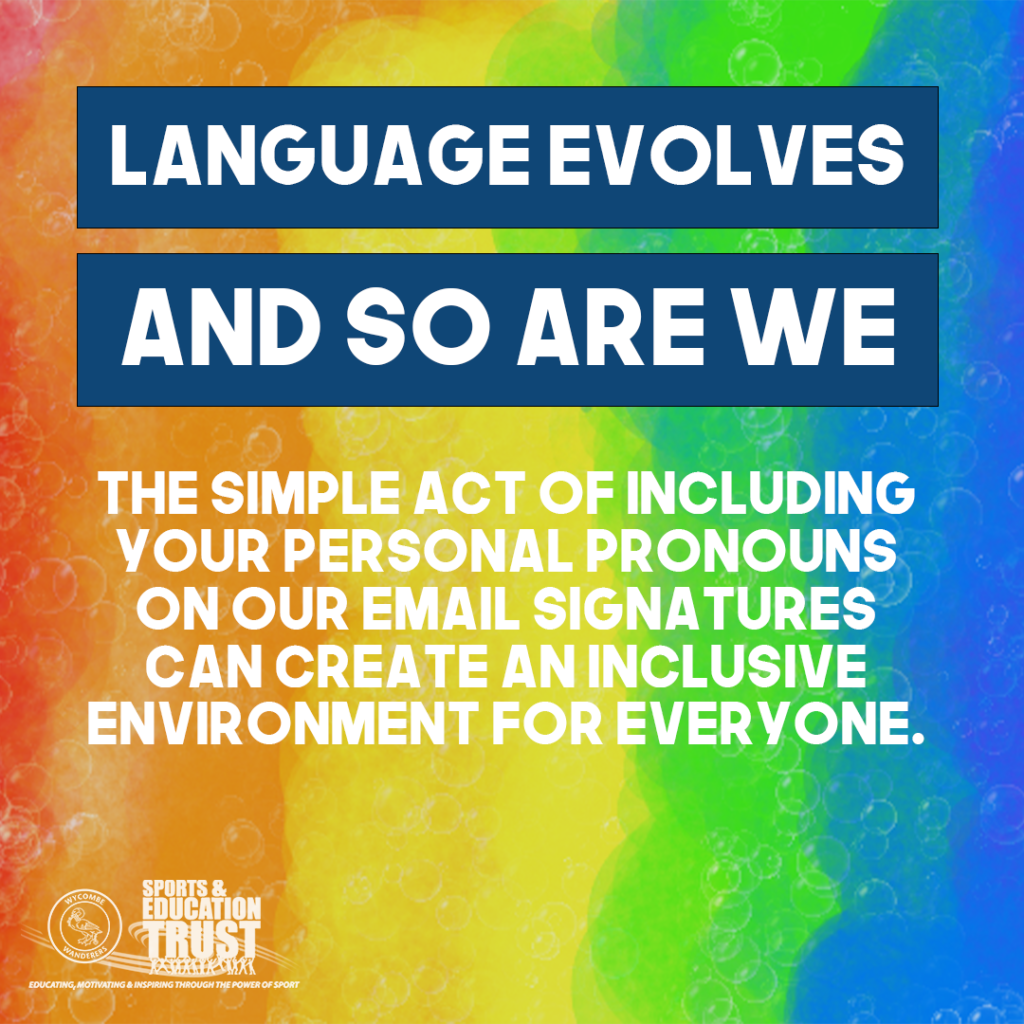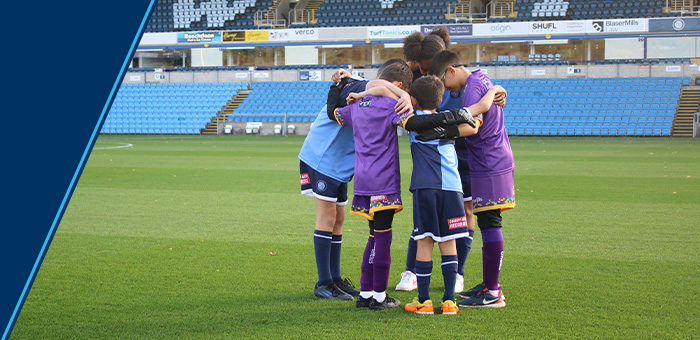Wycombe Wanderers Sports & Education Trust (WWSET), as part of a recent conversation led by the newly founded internal ‘EqualiTeam’, are proud to be adopting gender pronouns into our professional communications from May 1st 2021.
This week is a momentous one for WWSET. It is the first week that all staff have been back fully from lockdown from the often difficult world of remote working, providing a much more ‘normal’ (whatever that means these days) environment around WWSET towers, full of enthusiasm and pedal-to-the-metal delivery schedules. Almost all of our usual delivery programmes have restarted this week.
A little over a month ago, we announced the creation of an internal group called the ‘EqualiTeam’, who would be responsible for observing how we operate on a day-to-day basis and identifying areas of diversity and equality that we can improve on, and ensure that we are as welcoming, inclusive and accepting as we can be. EqualiTeam meetings have started impressively well with many hot topics under discussion.
One of the discussions currently taking place is how can we create a more inclusive workplace so as to be more understanding of the diverse array of people we work with every day in our community. Creating a diverse and inclusive workplace can be an extremely complex task, but the important thing is to get started one way or another. At WWSET, we are taking steps to ensure our communications are inclusive, and we will be looking to enable conversations about people’s preferred gender pronouns.
Gender pronouns are words that an individual would like others to use when talking to or about them. The most commonly used pronouns are “She/Her/Hers” and “He/Him/His”. People who are transgender or gender nonconforming may choose to use pronouns that don’t conform to binary male/female gender categorisations, such as “They/Them/Theirs”.
WWSET Community Health Delivery Officer, Gee Grou (She/Her/Hers), led a presentation to the whole staff body on the importance of pronouns and why pronouns are so important, how to approach a conversation around asking someone what their pronouns are, and what WWSET can do to break down the walls of stigma that hinder the progress of LGBTQ+ inclusion.
“It was a wonderful morning full of information, questions, and new knowledge”, she said, before adding, “I am looking forward to seeing how we progress as a community and an organisation when relating to equality, diversity and inclusion topics. It really is so important to take these steps as a community-based charitable organisation!”
Head of Communications at WWSET, Mark Fawkes (He/Him/His), praised the discussion, saying: “It was great to have an open and frank discussion about such an important and relevant topic. Being open to a discussion about people’s preferred pronouns is a wonderful first step in becoming a more inclusive organisation.”
He would go on to add of his own knowledge, “It has become clear through this meeting that I didn’t fully realise the positive impact that simply showing you are open to a conversation about pronouns could have on a person, and it’s great we are taking this step as an organisation.”
WWSET are proud to have taken this step and will continue to look to other initiatives in the coming weeks and months.
Some areas under discussion:
Why are gender pronouns important?
If an individual has never had to worry about which pronouns others use for them, you might assume this matter is a trivial one. But when someone is referred to with the incorrect pronoun, they can feel disrespected, invalidated, and alienated. You can’t always tell what someone’s gender pronouns are simply by looking at them. Knowing and using someone’s gender pronouns is a positive way to support the people you work with.
How do I ask someone what their gender pronoun is?
As part of an introduction or icebreaker with a new colleague or client, you can say “Tell us your name, your role, and if you’re comfortable, your gender pronoun.” You might hear gender-neutral pronouns like “they, them, theirs” – or some people prefer that you simply use their name.
In a one-on-one conversation, the best way to ask can be with a really straightforward: “What are your gender pronouns?” or “Can you remind me of which pronouns you like for yourself?”. Done correctly, there should be no offence in asking!
What happens if I use the wrong gender pronoun for someone?
If you realise it at the moment, correct yourself – you can simply apologise and restate the correct pronoun. If you realise your mistake after the moment, apologise in private and move on. In either case, don’t dwell on the mistake. Whilst it is inappropriate to make the person feel awkward, and as long as no offence was intended, honest mistakes are often easy to rectify. It is your job to remember and respect someone’s gender pronouns once they have informed you of their choice.
Communicating gender pronouns in company email signatures
An easy way for companies to introduce gender pronouns into the conversation is to add them to email signatures. From May 1st 2021, WWSET team members will be including our preferred pronouns on our email signatures. This acts as a reminder internally, while also building awareness externally. Most people have not been questioned about their gender identity. This is a simple way to show that we care about and respect the people who are in that minority who are questioned about their gender identity.
Taking inclusion one step at a time
Adding gender pronouns to our company email signatures is a great first step to building inclusivity at work. It brings awareness to something that many people might not have thought about before, and if it provokes one positive conversation around pronouns or makes a person feel respected, it has been worth its weight in gold. The discussion around gender pronouns provides further education as to why it’s an important part of people’s identity that should be respected.


